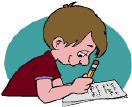 Assessment K-6
Assessment K-6  Assessment K-6
Assessment K-6
HOW TO TEST STUDENTS
Testing students knowledge of a subject is sometimes very difficult. The I. Science MaTe Curriculum emphasizes process skills over content and the test should reflect how to think about different problems.
Scientists are problem solvers, and do not have to memorize facts or figures about their subject as much as they need to know how to get this information and to integrate information to develop and understanding of the entire problem. As emphasized throughout this program, science is a process whereby that obtains informational through a systematic knowledge of a subject. Throughout the program there are many ways to test the progress of students. A pre-evaluation and post-evaluation are recommended.
STUDENT WORKBOOKS
Student lab sheets help guide the student through their weekly hands-on activities and will reinforce what they are learning. The entries made by students will strengthen penmanship, writing, reading, and art skills. Many of the questions are open ended and encourage critical thinking and creativity. If kept together in a portfolio style with lab sheets together, improvements, can be seen over time as well as an immediate assessment to share with family or school administrators.
ORAL RESPONSES AND INTERVIEWS
As students are conducting their activities, ask students to show you what they are observing. If you ask, "Do you see it? Students will usually answer yes even they donít see it. Ask questions like, "Point out what you see," or "Describe what you see." Some well-stated questions help you recognize if the students are focused on the task at hand.
PARTICIPANT OBSERVATION
After the students are given instructions by the teacher, observing how the students interact in their groups can give you insight in their learning. Are students working well with each other? Sharing equipment? Or are they fighting over it? Are they discussing their activity or are they off task? Are they recording their observations? Did they select the correct materials? Are materials being used properly? Are materials and equipment cleaned and returned properly? Are students working in a timely manner?
OBSERVATION OF STUDENTS IN HANDS-ON PERFORMANCE TASK
After students have completed their lab activity, take one station or part of an activity and see if students can perform the experiment again. This can be done one week after the activity and see if students can perform again. This can be done one week after the activity, a month, or even same day. This can be done with individuals, small group, or as a class.
PICTORIAL RESPONSES
Students can response through art, diagrams, charts, or data tables. Artistic representation of observation as well as descriptive words are encouraged in lab sheets and activity sheets. This allows students with reading and writing disabilities to be correctly judged on their science performance.
RESPONSE TO OPEN-ENDED QUESTIONS
Many of the student lab sheets begin with open ended questions. These questions allow students flexibility and creativity in their thoughts and justifications of ideas. Open response questions encourage critical thinking and can spark student initiation of ideas.
MULTIPLE CHOICE QUESTIONS
Multiple choice questions can be found at the end of each unit in the six volumes of Integrating Science, Math, and Technology Program. Questions ask information that must be inferred from activities students were involved in. These questions have proven to be useful as a review and to spark class discussions, and even as a homework assignment to review. Students can use their lab books to help answer questions (like an open book test) which encourages their need for recording as much information as possible for later use.
Assessment forms can help evaluate studentsí attitudes before and after the initiation of the I. Science MaTe program. This can help you determine how the students are responding to the program. An administratorís task is to make sure that science is successful at their school site. Unfortunately, sometimes the problem may be an ineffective teacher. These evaluationís can help determine if the teacher is transmitting the fun of the I. Science MaTe program.
One would use the lab sheets and the worksheets of the (pre) and (post) as a grading mechanisms. You can take these sheet and make them into a workbook for the students. This way students can refer to some of the previous labs that might be useful. Students in many instances are working together, so you will be evaluating the groups performance.
After each chapter we provide suggested written tests that try and get the main points of the unit. This section is more content originated, but some of the questions try to see if the student really understand the materials. Included in this testing units are the pre, during, and post lab materials.
Another way to test the students comprehension is to put the material out from the labs and ask questions about them. You can include any of the material in the lower grades.
Remember this program was designed to spiral to a level of science competency. If your students have not had the previous grades material, they may not be able to perform up to grade. These students can "catch up" by working independently on the previous labs. You can have students that remember the previous labs to help the student.
This program can also act as a guide to your teaching the major concepts. The test questions and the concepts try to avoid memorization of specific facts. If students have experienced all the material they should be able to get a good grade. Remember, a good teacher usually gets all students to perform! You should be delighted if all your students get an A.